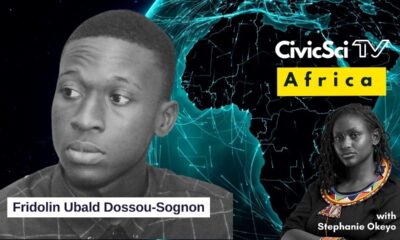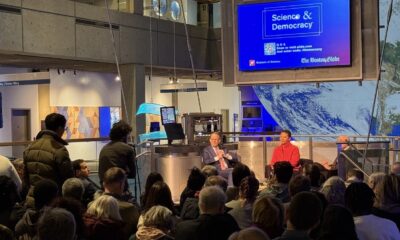Stories in Science Special Series
PhD or Family? Does it have to be one or the other?
Aditi Deshpande is a scientist at Allena Pharmaceuticals in Newton, MA. She is a biochemist and a chemical engineer by training. Dr. Deshpande is motivated to transform emerging science into products suitable for commercial development and also bring first-in class therapies into unmet disease areas.

Aditi Deshpande
[su_boxbox title=”About” box_color=”#262733″]Aditi Deshpande is a scientist at Allena Pharmaceuticals in Newton, MA. She is a biochemist and a chemical engineer by training. Dr. Deshpande is motivated to transform emerging science into products suitable for commercial development and also bring first-in class therapies into unmet disease areas.[/su_boxbox]
[dropcap]M[/dropcap]y grandfather inspired me into the world of science. He had a PhD in botany – the only one in the family – which he attained in the ‘40s in India. Looking back, I can’t imagine what it must have been like to do a PhD back then. I remember his stories about how difficult it was to get a PhD. Surprisingly, I was not discouraged. In fact, I was inspired and I wanted get a PhD and carry forward his legacy. Thus, I left to pursue my dreams in the U.S. in 2003. I wanted to get the necessary educational training to enable me to make a difference in human lives. So, what happened? Here is my story.
I stumbled onto my first hurdle on my path while I was studying for my master’s in chemical engineering in the U.S. The issue was that my expectations of the program and my then advisor’s expectations of me did not match. I was made to feel that I was not good enough to be pursuing this path. My scientific interests were not taken into consideration when a project was assigned to me during my first year into the program. It was not before it became evident to me that the environment was not right for me. I ultimately made the difficult decision to leave with a master’s degree and not pursue the PhD degree there. In retrospect, I actually thank those circumstances because I think they partly made me who I am today.
After leaving the program, I decided to pursue a job in industry. I started working for a pharmaceutical giant as an Associate Scientist. I got to learn many things during that period through the plethora of cross-discipline smart people I met and worked with every day. However, my dream to do a PhD still lingered in my mind. Though, as the years passed, I started feeling unsure whether I would be able to do it. Before I knew it, five years would pass by working at the same company and I was fairly close to turning 30 years old. My personal life didn’t stop. I actually got married in that time frame. Both my personal and professional lives had changed quite a bit. But I kept asking myself whether the PhD would merely remain a dream in my life. Would I ever realize my love for research?
Things became quite challenging with the birth of my daughter 5 years into the program.
Some say that real dreams are those that don’t let you sleep. I think that was very true in my case. I wanted to go back to academia. My spouse encouraged me to take the plunge. However, so much time had passed that I had to retake the graduate record examination (GRE) and the test of English language proficiency (TOEFL) which are required to enroll in most US universities. I had taken those tests before coming to the U.S. but the scores had expired. I had to start all over again. After six months of tests and applications, I was elated when I got admitted to a PhD program in the Biochemistry & Biophysics!
Fast forward a year into my program, my son was born. The balance of being a first-time mom and a PhD student was very difficult to strike. I had finished most of the coursework and had started doing lab work. My research work was focused on development of techniques to biochemically characterize metal-dependent behavior of enzymes. I wanted to stay longer in the lab to get things moving like my fellow classmates but I could not. There was a little new born life waiting for me that I had to feed and look after. Things had drastically changed personally and I started to feel the real challenges of the road I had pursued. There were numerous times where I would get close to finishing experiments but would be forced to leave so that I could pick up my son from day care. I stopped socializing with fellow students and spent that time in the lab instead. I had to be 200% productive in the 5-6 hours I got in the lab each day. I also started working with and training undergraduate researchers who could help me manage the long hours. This opportunity also developed my mentoring skills which I published in the Working Life section of Science magazine in 2017.
As you probably know, the PhD process can be quite long. As such, it is very easy to lose focus on the big picture or your motivation at times. It happened to me on multiple occasions. The one I remember the most vividly took place in my third year at a time when my lab results were not promising at all and the equipment required for my work were not available at my university. I was almost ready to quit the project. I was in a position where I had to decide on how to move forward. It was clear to me that I had to make sure I stayed motivated and on track to finish my work no matter what. I ended up collaborating with a professor at Harvard University to gain access and training on the equipment required for my work.
Things became quite challenging with the birth of my daughter 5 years into the program. Managing the newborn, my toddler son and my work became very overwhelming. We decided to move closer to the university so that I could go to the lab whenever possible and work around my kid’s schedule. Still in all of this chaos, there was something special that kept me going. I realized that my motivation to finish by PhD was stronger than before. My willingness to take on challenges was deeper than before.
I finally defended my PhD in 2016. My husband sat in a corner seat as I addressed a room full of scientists. It was an emotional moment for both of us. I flashed all the way back and I wondered how my grandfather would have felt if he was still around. My inspiration was in my family and my motivation all the years was also my family. It was my kids who helped me stay motivated. It was my spouse’s support that prevented me from quitting or getting derailed. I knew I had commitments to my family and I could only get to those if I kept going no matter what. In retrospect, I wonder how I would have done this without them.
I urge anyone in a similar phase of life wanting to pursue this road to go ahead and pursue your dreams. Your family will not be a hindrance but they will actually be the ones who will see you through. I am thankful things worked out for me. I now have my PhD and work as a scientist in early stage research programs at Allena Pharmaceuticals.
Cover Image by Theodor Moise from Pixabay | CC0 Creative Commons
Metrics
Sessions
Total number of Sessions. A session is the period time a user is actively engaged with the page.
Visitors
Users that have had at least one session within the selected date range. Includes both new and returning users.
Page views
Pageviews is the total number of time the article was viewed. Repeated views are counted.
The CS Media Lab is a Boston-anchored civic science news collective with local, national and global coverage on TV, digital print, and radio through CivicSciTV, CivicSciTimes, and CivicSciRadio. Programs include Questions of the Day, Changemakers, QuickTake, Consider This Next, Stories in Science, Sai Resident Collective and more.

-
 Audio Studio1 month ago
Audio Studio1 month ago“Reading it opened up a whole new world.” Kim Steele on building her company ‘Documentaries Don’t Work’
-
Civic Science Observer1 week ago
‘Science policy’ Google searches spiked in 2025. What does that mean?
-
Civic Science Observer1 month ago
Our developing civic science photojournalism experiment: Photos from 2025
-
Civic Science Observer1 month ago
Together again: Day 1 of the 2025 ASTC conference in black and white
Contact
Menu
Designed with WordPress
























